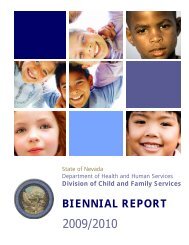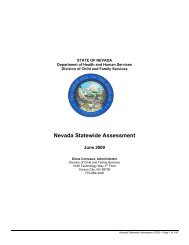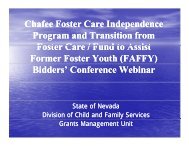STATE OF NEVADA - Division of Child and Family Services
STATE OF NEVADA - Division of Child and Family Services
STATE OF NEVADA - Division of Child and Family Services
You also want an ePaper? Increase the reach of your titles
YUMPU automatically turns print PDFs into web optimized ePapers that Google loves.
“Transitional Plan” for IL. Information <strong>of</strong> the ETV program is provided at the development <strong>of</strong> youth transition planning <strong>and</strong><br />
during the youth’s exit interview.<br />
Currently established collaborations with community-based IL contractors have exp<strong>and</strong>ed to include outreach <strong>and</strong><br />
educational goal planning for foster <strong>and</strong> former foster youth. Improved tracking <strong>and</strong> reporting requirements, as well as<br />
specific outcome-based procedures have been developed. The DCFS contractors, community partners, state <strong>and</strong> county<br />
social workers are coordinating <strong>and</strong> collaborating to provide that services are delivered to the highest number <strong>of</strong> eligible<br />
foster youth <strong>and</strong> to ensure that youth are encouraged to follow through with postsecondary school application<br />
requirements <strong>and</strong> funding requests. With an increased focus on postsecondary education from all IL contractors, which<br />
includes assistance in planning educational or vocational training, applying for financial aid <strong>and</strong> additional support, more<br />
youth will remain motivated to reach their educational <strong>and</strong> vocational goals.<br />
2. Assist youth receive education, training, <strong>and</strong> services necessary to obtain employment<br />
Statewide, the Chafee funds support IL programs, which provide individualized life skills trainings <strong>and</strong> workshops for<br />
foster youth to prepare them for self-sufficiency in the community. IL Advisors assist youth to determine job interests,<br />
necessary education or vocational training, job workshops, budgets, practicing informed decision making <strong>and</strong> other skills<br />
necessary for employment. The ETV Program fund removes barriers for foster youth to attend vocational school or<br />
trainings to further their employment opportunities.<br />
3. Assist youth prepare for <strong>and</strong> enter postsecondary training <strong>and</strong> educational institutions.<br />
Educational achievement determined by the number <strong>of</strong> youth who leave foster care with a GED or high school diploma<br />
has dropped in recent years in Nevada. Approximately 59% <strong>of</strong> exiting youth receive a GED or high school diploma, as<br />
many youth are unable to pass the required state basic skills pr<strong>of</strong>iciency tests. Additional tutoring in basic skills such as<br />
English or math is necessary for many foster youth, as these youths <strong>of</strong>ten become discouraged <strong>and</strong> do not make the<br />
additional effort to obtain their GED or high school diploma after exiting from foster care.<br />
Following state funding initiatives for former foster youth, a database is under development to track characteristics <strong>of</strong> the<br />
foster youth transitioning out <strong>of</strong> care. This will allow more effective transition planning <strong>and</strong> increased interventions for all<br />
exiting youth <strong>and</strong> provide a more complete support system for the youth upon exit. Identifying youth, before exiting care,<br />
with educational deficiencies <strong>and</strong> providing services such as tutoring, postsecondary education workshops, GED<br />
preparation <strong>and</strong> testing will better prepare youth to enter <strong>and</strong> complete postsecondary education <strong>and</strong>/or training programs.<br />
To qualify for the ETV program, foster youth must be planning to graduate from an accredited high school, must have<br />
graduated from an accredited high school, or must have a GED or certification <strong>of</strong> high school completion for students who<br />
completed the m<strong>and</strong>atory hours required for high school instruction, but did not pass the high school pr<strong>of</strong>iciency exams.<br />
The youth’s postsecondary school or vocational/training program must meet the following criteria:<br />
1. Must be accredited or pre-accredited <strong>and</strong> is authorized to operate in that state.<br />
2. Admits only students with a high school diploma or equivalent <strong>and</strong>/or students beyond the age <strong>of</strong> compulsory school<br />
attendance.<br />
3. May be a public or nonpr<strong>of</strong>it school or training program that awards a Bachelor’s Degree.<br />
4. May be a public or nonpr<strong>of</strong>it school or training program that <strong>of</strong>fers not less than a two-year program <strong>and</strong> that provides<br />
credit toward a degree, or provides training towards gainful employment.<br />
5. May be a vocational program that provides training for gainful employment <strong>and</strong> has been in existence for at least two<br />
years.<br />
Although youth are encouraged to participate in full-time educational programs, the ETV program does not exclude youth<br />
who attend less than full-time, as this would limit the number <strong>of</strong> youth who would benefit from this program. The program<br />
provides personal <strong>and</strong> emotional support to youth through mentors <strong>and</strong> to encourage <strong>and</strong> promote interactions with<br />
dedicated adults.<br />
IL <strong>Services</strong> are provided by contracted community partners <strong>and</strong> focus upon services for foster youth in care, the<br />
transitioning youth, <strong>and</strong> the youth who has aged-out <strong>of</strong> care. Specialized case management is developed for the youth<br />
<strong>and</strong> allows tracking <strong>and</strong> outreach. Each program coordinates information <strong>and</strong> referral for the youth. In addition, state<br />
<strong>and</strong>/or county social workers are available to youth <strong>and</strong> refer former foster youth to services. The ETV Program builds<br />
upon services available with existing programs <strong>and</strong> youth <strong>and</strong> their IL Advisors/Social Workers may contact the State IL<br />
Nevada APSR – SFY 2010<br />
Page 96 <strong>of</strong> 108
















